Don't wanna be here? Send us removal request.
Text
Figure out who you are, what you want and who you should date at FLICKS BY CHICKS FESTIVAL OCTOBER 21st!

Really couldn’t finish blogging about the incredible slate of films at the FXCF this weekend without mentioning First Date, Imago and After Words - 3 very different, but oddly connected treaties on the spectrum of love!
6 PM - SHORTS BLOCK SCREENING at Alamo Drafthouse Cedars 1005 S Lamar St. Dallas (https://prekindle.com/event/33691-flicks-by-chicks-fest-dallas)

In First Date, we have a comic exploration on when love is first promising and then goes extremely right. To offer more about the film would give away what makes it charming and relevant.

In After Words: The Opposite of Foreplay, Claire’s search for love and satisfaction is a room with a view of post coital yearnings.

And in Liz Cardenas Franke’s Imago, our lead character is in a state reminiscent of the Anais Nin quote “And the day came when the risk to remain tight in a bud was more painful than the risk it took to blossom”

All three of these wonderful films help us understand something about ourselves and the world at large using sometimes humor, sometimes empathy and deft storytelling.
Take a friend, grab a ticket and join us for this day and night (filmmakers luncheon, script to screen workshop, film screenings and networking/awards party) of celebrating the mission of Women in Film - to promote, empower and mentor women in the industry!
0 notes
Text
Kaleidoscope Days gives us a continually changing pattern of relationships...

This exploration of flawed family screens October 21st as part of a slate of dynamic shorts by female filmmakers at the Flicks by Chicks Film Festival!
6 PM - SHORTS BLOCK SCREENING at Alamo Drafthouse Cedars 1005 S Lamar St. Dallas (https://prekindle.com/event/33691-flicks-by-chicks-fest-dallas)
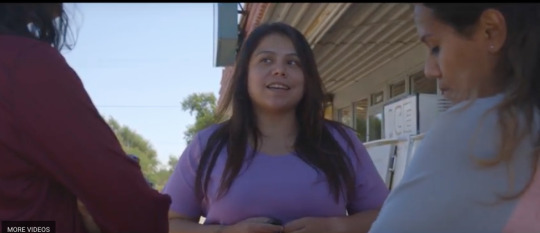
Local Filmmaker, Jasnik Moreno created this gem as her senior thesis at UTA. We are elated that she is going to be at the festival and wanted to chat with her briefly about all things Kaleidoscope Days!

FXCF: Kaleidoscope Days is a very moving and empathetic look at a flawed main character and her relationship to her daughters. It is so easy for writers to fall into the trap of writing imperfect characters, but then judging them. You don't let Dolores off the hook, but at the same time - you manage to make us care about her and want to understand her. Did you find crafting that character difficult and were you clear emotionally on how you wanted the audience to feel about her?
J: I honestly was never sure how an audience might feel about her. Even now I’m nervous about it because we don’t ever explicitly hear about all the mistakes she’s made, but I’m fascinated by the way people perceive her. And that’s my favorite part about creating characters is seeing how they are viewed by people who are all as different in their own ways. It was difficult in the sense that she wasn’t based off of a sole person I knew but rather emotions I’ve felt and emotional turmoil I’ve seen others go through - and even turmoil I can imagine people have gone through just based off my own assumptions. I put a lot on Dolores, and seeing as how I’m not a parent of two teenagers I had to really see things through a foreign perspective. Elisa Annette (played Dolores) really helped me reassess a lot of her motives and what made her the character you see on screen as the final cut.

FXCF: Casting is key to a low budget project - I loved the cast. Did you know these actors and have them in mind when you were writing or did you do a casting call and bring them all in separately? A friend of mine worked with Spielberg and said he is nervous interacting with actors and mostly leaves them alone - then there are directors like Sydney Pollack who was very involved in the actors process. What is your approach to working with actors?
J: I was not writing for actors, I had to cast. I got really lucky with the casting but first I had to get dragged through the mud. I think I did like 3 separate casting calls because I knew finding Dolores was crucial. Fortunately Elisa was one of the first women I saw and she blew me away. I already knew she’d be it. I had to do a lot of searching to find Teresa, and I did eventually after attending a film festival geared for Latin American filmmakers, I connected with Miranda. As for the character of Dani I ended up having to gender swap since originally that character was a son. I think it really worked out in the end since Ruby did an amazing job.
My favorite part of directing is talking to the actors. I am very empathetic so I love to see what feelings they feel first when reading the script. Where they are coming from and all that. There’s definitely a lot discussion and “what ifs”. I don’t let them know too much about the backstory in my head because I trust that they have the potential to expand on their own - they should! I know I’m working with a good actor (despite their skill or experience) if they have doubts about what I typed out. I love those moments where their suggestions seem so obvious I’m always mentally slapping my forehead as to why I didn’t think of it before.

FXCF: The Kaleidoscope is a significant prop and obviously part of the film title. Why is that a prominent part of the narrative and, although I have my take on how it relates to the story - what was your intention?
J: The kaleidoscope is a weirdly forgettable toy. I had one as a kid but I think it was cool in a moment and then I moved on to something else. So for this film I thought it fit as a good representation of childhood and it would garner enough attention since a kaleidoscope is a weird thing to hold on to. You’ve looked through one, you’ve looked through them all. Thus, in the film, Teresa & Dani made these homemade - mind you, a shittier version of one you’d buy at toys r us - kaleidoscopes as kids with their dad. Dolores holds on to it because it reminds her of the last moments before things were fragmented.
Which is another thing I liked about the kaleidoscope. How everything is broken up and you can’t really make out a whole since you are just looking at a fragment of something over and over again yet if you get past needing to know what the thing your viewing is you’ll see that these colors are beautiful! The movement of the little spinning effect is cool as fuck! There really is beauty in just taking in what you are given at the moment and letting the rest subside.
FXCF: Fun side note! Producer, Cydney Cox, was a student of mine at SMU - she rocks and come meet her and Jasnik at the screening and events this Saturday!!
2 notes
·
View notes
Text
Killed in Action makes our hearts live again for female driven projects...

This thoughtful drama screens October 21st as part of a slate of provocative shorts by female filmmakers at the Flicks by Chicks Film Festival!
6 PM - SHORTS BLOCK SCREENING at Alamo Drafthouse Cedars 1005 S Lamar St. Dallas (https://prekindle.com/event/33691-flicks-by-chicks-fest-dallas)

Director Christine Weatherup and Producer, Beatriz Chahin (Katy Texas native and UT Austin grad!) were planning on attending the festival, but have the best of reasons not - prepping together for their next film! I was able to send a few questions their way to give us some insights on this wonderful film, Killed in Action.

FXCF: Christine – you wrote, directed and star in Killed in Action! I understand you were also a triple major in college. So, my question is…why so lazy?:) Nah…okay –your work in this film is incredibly nuanced and wonderful, I needed more. So, I watched your reel. Damn, you are talented! So my actual question is…do we need to create our own opportunities? Do you feel to move beyond killer supporting TV guest starring roles – you (representing all of us!) need to take the wheel and drive and create our own stories?
CW: Aw, shucks, you're making me blush! Thank you for those kind words about my performance. There definitely was an element of wanting to create my own opportunities, rather than waiting for them to find me. As an actor, you can often feel very powerless: you're waiting for a role to be written that you are right for, then the opportunity to audition for it, and then the chance to play it. There are a lot of barriers. Sometimes you get lucky enough to cross those barriers, but by creating your own content, you can steer the ship: you can choose the kinds of characters you want to play and stories you want to tell.
However, I should say that I've always been drawn to working behind the camera, and as a child was inspired by Jodie Foster. I admired the fact that she not only played intelligent, layered women, but she also produced and directed many of her own projects -- perhaps there's a correlation between the fact that she got to play such complex roles when she was taking an active part in developing projects? For me, it was time to helm my own work. And what a fulfilling experience it was! At the end of our shoot, I found myself feeling like I had found my voice in a way that I never had as "just" an actor. I'm really excited to continue growing as an actor in both my own projects and those of others.

FXCF: Beatriz – you grew up in Katy, Texas and went to UT Austin. Was the transition to Los Angeles a difficult one? Did you consider staying in Texas for a creative career or do you think if you want to work in the industry it’s important to be in New York or LA?
BC: In some aspects it was difficult -- I knew that living far away from my family and many of my friends would be tough. I will say that I was very fortunate with the group of friends I made out here through the UTLA (University of Texas, Semester in Los Angeles) Program. That certainly made the transition easier because I was able to live and intern in Los Angeles, so I was able to start establishing roots and find my footing. The industry has changed so much in the 7 years I've been in Los Angeles. While I personally didn't consider staying in Texas for work at the time, I don't think it's absolutely imperative to be in New York or LA. Opportunities in the industry can be found all over, especially in Texas! Dallas, Houston, and Austin are all particularly great cities to work in, and I know a lot of films and TV shows have been based in each of those cities.

FXCF: This next one is for both of you – from a creative and a production aspect, this was an ambitious project. Setting it in 1948, the period details needed to be perfect and it’s a story that weaves different places emotionally. What were some of the challenges you had both creatively and logistically pulling this off?
CW: I had been sitting on this script for quite some time precisely because of the scope of the project. It was crucial that the period details felt authentic rather than like actors playing dress up. People often talk about the project management triangle of quality, time, and money (you can only have two). We knew we wanted high quality, but were short on money. We did, however, have the time to cultivate an incredible cast and crew, as well as raise money. Over the course of a year, we applied to a few grants and were lucky enough to receive one from the Puffin Foundation, then we launched a successful Kickstarter campaign, and crewed up. We were lucky enough to attract incredible collaborators who helped shape the look of the film. Among them, our DP (Bobby Lam), our Production Designer (Buffy Morton) and our Costume Designer (Dana Olinsky) helped shape the look of the film. But even with the money we raised, it was still a tight budget for a period piece. We had one day to shoot the entire film. Our prep for the film along with the passion and talents of our team helped us pull it off in the end!
BC: As far as logistics go, we did the entire shoot in 1 day! As a producer, it's an exciting (and slightly terrifying) challenge since we had to load-in, shoot the entire movie, and be completely wrapped out in that time. As Chrissie mentioned, we were fortunate enough to have a fantastic team that helped make it all happen. Everyone involved was completely in sync -- there's no other way the film could have come out the way it did without all of the parties involved. With the funds from the Puffin Foundation and our Kickstarter backers, we were able to get to a place financially where we could afford things that would aid in logistics, such as a location that was used to having projects film there, and a location/site manager.
0 notes
Text
A Day Late and a DIME SHORT disprove that adage that people become too feeble to be of any use...
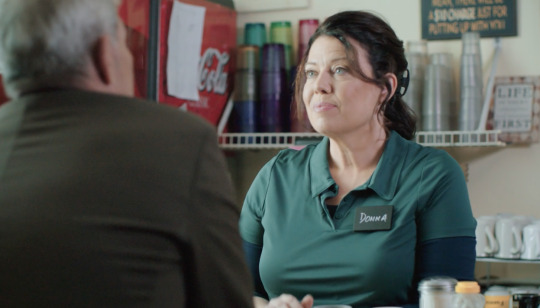
Welcome to the diner of the downtrodden in writer Laura Carson and Director, Krista Gano’s beautifully realized tapestry to humanity in the face of loss.
This tender drama screens October 21st as part of a slate of provocative shorts by female filmmakers at the Flicks by Chicks Film Festival!
6 PM - SHORTS BLOCK SCREENING at Alamo Drafthouse Cedars 1005 S Lamar St. Dallas (https://prekindle.com/event/33691-flicks-by-chicks-fest-dallas)
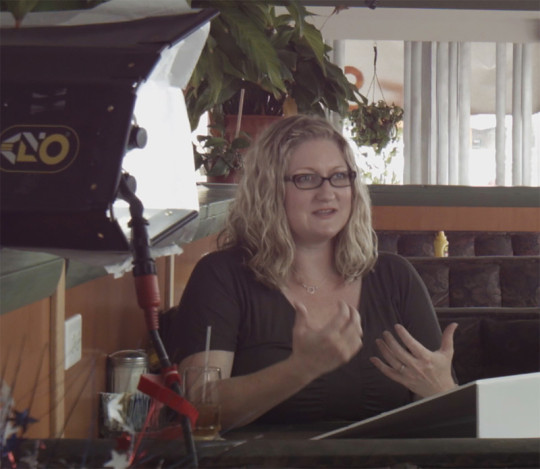
We were thrilled to find that both Laura and Krista were going to be able to fly into Dallas for the festival and we had the chance to dialogue about their film via email prior to their arrival - here’s the scoop!
FXCF: It’s really amazing to me how many characters you jam into a 10-minute short and do them all service. It’s very nuanced writing – for example a throw away line like “I’d be using my MBA” tells us in a very organic way that Laura’s character is not a career waitress, but has fallen on hard times. It’s important because it gives us a tangible reason she has so much empathy for everyone else in this diner of the downtrodden. Did you have any qualms about the amount of characters and backstories you were exploring in such a brief page count?
LAURA (Writer/Actress) One of the key themes I wanted to explore was the concept of community being critical to people who've fallen on hard times and how they might find the support they need in their neighbors. So I needed enough characters to paint a sense of community. There is also a lot of pride and shame woven into Bob's character and I wanted the reveal of his "secret" witnessed by many to deepen that wound for him.
Also a large number of characters helped me show the scope of how many people are challenged by our "new" economy in ways that might not be readily apparent to an observer. I LOVE the "diner of the downtrodden" phrase. Thank you; I'm going to steal that going forward. Yes, Donna, looks over her charges, seeking to remain "relevant" in a job that is clearly beneath her education but not beneath her humanity. Thanks for appreciating the economy and efficiency of the clues and dialogue planted to show rather than tell the story. These little bits of info are always around us, thrown away and so we don't notice them or connect them to what is the bigger story of a person's life. Like in the case of Pete, wondering what his life story might be that has him homeless yet knowledgable of Kleptocracy. Or the Young Woman's "dead dreams" comment about Bev. Or how Bob refers to the photograph of his family and says, "heartbreaking, right?" I have to give the wonderful Tim Brennen credit for improvising that line - it is perfectly in alignment with the intentional mystery of these characters. I want each viewer to make their own assumptions about what these clues could mean. So I didn't have qualms at all about several characters.
Krista (Director/Producer) I was actually excited to work with so many characters and had encouraged Laura to really make sure that each community member had a clear story of their own. We were really playing with the notion of how much we put of a front that everything is okay. Whether it be because we trying to impress, or we are in denial, or because it's too hard to ask for help, we are masters of hiding our internal worlds. Laura and I kept talking through the ways that we could show this. The written script is largely the mask we are wearing to others, while the unspoken details (just as carefully crafted) are where the internal truths leak out. So, because the idea is that we all engage in this behavior, it was important to explore that wth all the characters in varying degrees.
My favorite things to explore are relationships in groups of people....families, neighbors, etc. I love working with actors to subtly show the complexity that is inherent in those relationships. My next project, Comfort Food really looks at those same dynamics through the lens of a grieving family trying to re-connect. Working with the actors on Dime Short to show those differing layers of character was intensely fun.
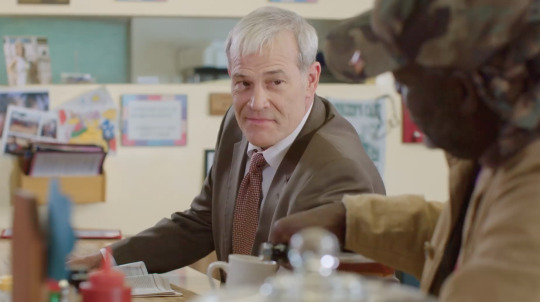
FXCF: Two things are always important to me beyond the storytelling when watching a short film – really good acting and really good sound. Both were stellar in Dime Short. Okay, I have a good idea how you convinced Laura to take the part (lovely, lovely work!) but what was the process of casting for you? Everyone was just terrific. You were shooting out of LA (or at least it plays to be Colorado) and no one makes much on a short film – so, how’d you get such a great cast?
Krista (Director/Producer) Thank you, so much! What a huge compliment. Laura and Tim are both friends of mine from our time together at The Groundlings Theatre in LA. Laura had really written this script with her and Tim in mind (which was an amazing start in terms of casting). I'm now living in Denver and have a company called The Working Artist Group, which consults actors on how to move from hobbyists to working professionally in television and film. So, I know and work with a lot of local Colorado and NM actors. As Laura was writing more diner characters, I knew exactly who was right to play each one. We have some really wonderful local talent and it was important for both Laura and I to highlight them in a piece that was shot and set in small town Colorado. I think because I work with actors all the time on both their business and their craft, it gives me unique insight in working with them as a director. I was an actor, I have spent a career working with actors, and ultimately love actors and the craft. My hope is to always cast to their strengths and create spaces and opportunities for them to do great work. We were also tremendously lucky to have Jon Diack, Jennifer Anguiano and Jen Piech from Nogginsauce as producing partners because they really allowed Laura and I to drive the creative part of the ship. Thanks also for the note about the sound. My husband, Greg Upton, is a musician who hales from Texas. So, we were really blessed to have his work on this piece. Our sound guy on set, Patrick Badgley did an amazing job capturing the sound and Matthew Polis was wonderful to work with in post. I actually didn't really start to "see" a finished film until the sound came together. Those kudos go straight to that entire sound department. As a side note, Tim Brennan brought in a different take on Bob than what I initially saw in my head. I had to make the decision on set to either let him steer that character his way, or to try to negotiate something closer to my vision. I made a hard, but very clear decision to support his vision of Bob. I was watching the macro, but he was focusing on Bob in a clear, thoughtful and discerning way. As a result, we needed to change some of our plans and do some quick dancing on set, but it was really worth it. Tim Brennan imprinted something that I couldn't see on this project and ultimately re-taught me the lesson of collaborating and trusting your artistic partners.
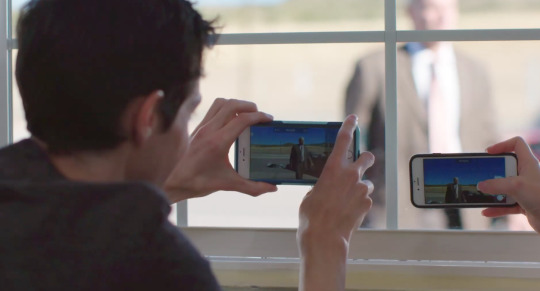
FXCF: I love that this piece isn’t over written and it has so much humanity, depth and feeling. But much is left for the audience to assume or fill in – what inspired this piece and what are you hoping the audience takes away from the experience?
Laura (Writer/Actress)It was very intentional to paint an unfinished picture and let the audience walk away hopefully curious about these characters; turning over the clues in their minds and piecing the puzzle together. Like why Bob takes the longest pee ever.... Could that lead to a curiosity about other people in their lives? A lofty goal perhaps but I love how Krista Gano's direction made a quiet, slice-of-life film that tonally speaks to the quiet desperation of Bob. It's a gentleness with the material that I just love and it elevates it to tragedy in my mind. But with hope. A tenuous hope but hope nevertheless. The story was inspired by a vision that popped into my head many years ago of a homeless man drinking a milkshake. I have no idea why it showed up and there was no other context for it. Just a homeless man drinking a milkshake, getting lost in the goodness of it. Strangely enough, I would kind of see this image a few years later when my father was in a nursing home and required me to bring him an almost daily milkshake. It triggered that image again and that is when I started writing the script in 2010. My mother used to make me milkshakes when I was sick as a kid and the cold milk flowing over my inflamed throat, the sweetness and the richness were wonderful. Despite feeling awful, that milkshake made by Mom created a momentary physical and emotional oasis of security and "sweetness" in my life. So I wrote "Dime Short" with the hope that we as a society can find the sweetness, find security, find our own emotional oasis, if just for a moment, when we've lost possibly everything. More importantly, how do we do that for each other? Krista (Director/Producer)I read this script when it was in the first draft form, and I could already see this world. My hope is that audiences leave with different impressions of this film. That they talk about how we see other's struggles and how we support each other when the chips are down. I hope they question the action of treating one person's worst day as their day's entertainment One of my favorite things is to hear people talking about is what happened to Bob's family, how did Donna land here, what happened to Bev, or how did Pete's son die. It's been really interesting to hear the different theories. Our greatest compliment is hearing that people would love to know more about this world and these characters. They stick with you as you leave and that's a pretty remarkable outcome as a filmmaker.
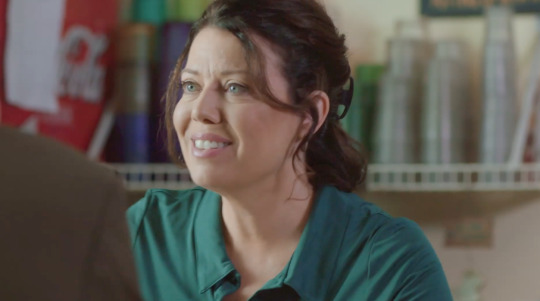
0 notes
Text
Ctrl Alt Delete..nah, you’re going to want to stay on this page...

Roni Geva & Margaret Katch met in Chicago at their survival job. Once they moved to LA, they discovered that they both loved talking about their abortions. And that they needed to collaborate immediately.

That collaboration became the provocatively funny Web Series, Ctl Alt Delete. The second episode is Phillipa, which screens October 21st as part of a slate of dynamic narratives by female filmmakers at the Flicks by Chicks Film Festival!
6 PM - SHORTS BLOCK SCREENING at Alamo Drafthouse Cedars 1005 S Lamar St. Dallas (https://prekindle.com/event/33691-flicks-by-chicks-fest-dallas)
Since abortion and comedy are hardly ever in the same conversation - I had some questions! Lucky for me, I also had their email address and got some great answers!

FXCF: Abortion! Okay, we’ve established that you clearly like to play it safe as a writer☺ This story is Episode 2 in a web series set in an Abortion clinic. Did you have any anxiety around exploring this subject on film?
RONI: NOT AT ALL. It’s our JAM. (except Margaret does have fleeting fears of someone coming to kill her cats for revenge). One of the things that draws us to such topics (and me, in particular, with my history of The Arab Israeli Comedy Hour) is that comedy is a highly effective way of starting a conversation from a less antagonistic place. For example, just this week, a woman commented on one of our episodes with an anti-choice voice - however, there was no name calling or negativity - and it was actually a beautiful expression of a different voice. This allowed other people to get involved and express their differing opinions and the whole thing was very reasonable. When we laugh, the walls come down, and then all of a sudden, we see each other as humans instead of just ‘mouthpieces’. The fraught nature of this particular topic actually drives us to create MORE. We also have a few other projects coming down the pike and all of them deal with controversial topics that people normally don’t talk about with frankness.

FXCF: One of the things I find exceptional about it is the writing (you’re welcome!) – for example the line “what the fuck is wrong with us?” is like a master class to me in character. I understand her reaction, but I also understand her relationship to her husband with that one line. Are you that meta when you write? Meaning are you aware of what you are doing or is it more organic and flows out of you and feel you will just fix it later if it reads broken?
RONI: B. Also, thank you. We write and edit everything together. So - Margaret hypothesizes. Roni writes. Margaret and Roni read it out loud together and fix it. Or sometimes Margaret just takes the computer out of my hands and re-does a line. Then we futz with it over and over again until it feels like the character. We also both have an acting background so we intrinsically know when something feels right.
That line in particular, and that relationship, is really based a lot on Roni’s relationship and how she and her man talk to each other. We draw a lot from our actual voices and point of view.

FXCF: Holy cow! You work with another woman (Margaret Katch) and I’ve heard no rumors of catfights or groping! How do you manage to have a professional working relationship with another woman since as we know women are confusing, emotional and alluring creatures?
RONI: First of all, we knew each other professionally before we started working together creatively and had an existing vocabulary. We also have a similar aesthetic. AND we both feel like telling the best story is THE MOST IMPORTANT part of this - so egos don’t get involved. For example, at a recent festival screening, a joke played really well. Margaret turned to me and said: “good job on that one.” I turned back and said, “I actually think that one was yours.” And we honestly couldn’t remember (or care) how it came about. We’re actually writing this together right now, and finishing each other’s sentences.
FXCF: We are so thrilled you are flying into Dallas! We can’t wait to continue this conversation at the Filmmaker’s luncheon, script to screen workshop and screening Q&A!
0 notes
Photo
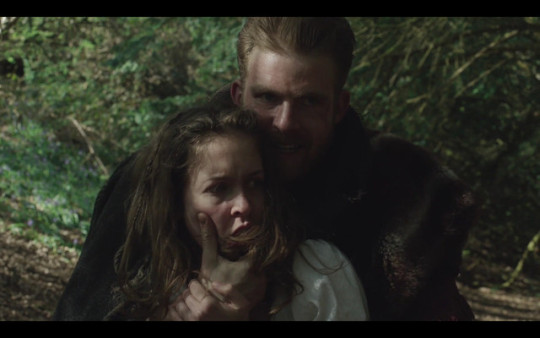
Shakespeare's most famous heroine breaks free in Director Jacqueline Pepall’s provocative short film, Ophelia's End. The film screens October 21st as part of a slate of dynamic films by female filmmakers at the Flicks by Chicks Film Festival!
6 PM - SHORTS BLOCK SCREENING at Alamo Drafthouse Cedars 1005 S Lamar St. Dallas (https://prekindle.com/event/33691-flicks-by-chicks-fest-dallas)
Finding myself obsessed with this terrific gem of feminist elizabethan badassery, I recently sent some questions across the pond to filmmaker, Jacquie Pepall.
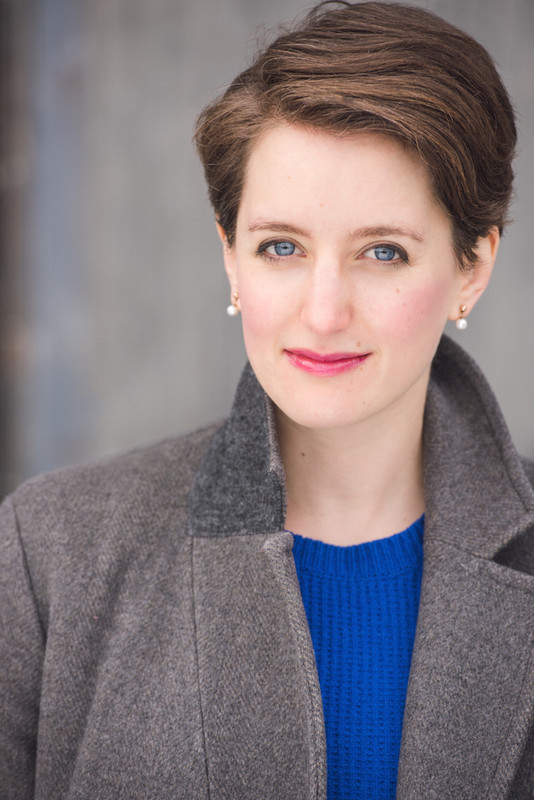
FXCF: To quote Two Gentleman of Verona "Good things should be praised"! So, I'll start out by saying, I loved Ophelia's End:). Did you have any concerns that a reimagining of Shakespeare using Elizabethan English would be hard for the modern film viewer?
JACQUIE: Yes, absolutely! We worried the language would alienate audiences, particularly in a festival context. It can take a moment for your brain to adjust to Shakespeare, and I worried audiences would feel confused or mis-sold. Ultimately though, I was just so attracted to the idea of opening the film with the funeral scene from Hamlet and using that scene (directly from the play) as the starting point for Ophelia’s story. In an early draft of the script we switched to more contemporary language after the funeral scene, but it felt too jarring - I wanted our film to sit alongside Hamlet’s world, so we decided to go all in on Elizabethan language!
FXCF: In Hamlet, Ophelia is most definitely a tragic figure and dominated by men. Quintin Tarantino in Inglourious Basterds flipped the narrative for Jews as being more empowered. Did empathy for her and perhaps a need to explore Ophelia's feminist empowerment prompt this project?
JACQUIE: Yes, exactly. I had this funny experience reading Hamlet in high school, where I really wanted to love the play - Hamlet had been in my consciousness growing up because my dad had named our dog Hamlet (!) - but I found I just couldn’t connect with the play. I wanted a female character that I could identify with. I found both Gertrude and Ophelia such archetypes of weakness. So, in a way, Ophelia’s End was a gift to my teenage self - an Ophelia that I could get behind.
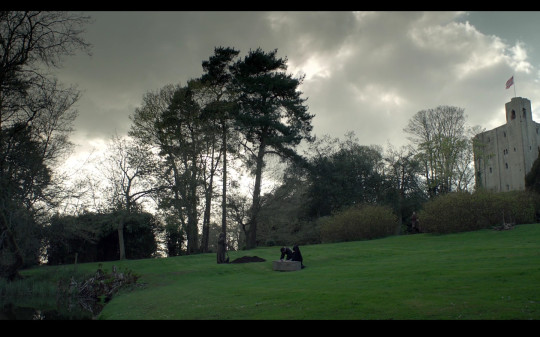
FXCF: Another aspect of the film that really spoke to me was the Queen's relationship to Ophelia and her assistance. And to a smaller degree the woman who witnessed her path to escape and didn't give her up. We so rarely see women helping other women in narratives (to be fair, we rarely see more than one speaking, significant woman in a film to create that dynamic!) - was that important in your development of the story?
JACQUIE: Yes - absolutely. The notion of Gertrude and Ophelia working together to (essentially) undermine the men of Hamlet is actually what drove me to make the film. I remember sitting in a production of Hamlet (at the Globe in London), when it occurred to me that that Gertrude is the only character in the play that witnesses Ophelia’s death (the audience doesn’t see Ophelia die, Gertrude reports the details of her death to Claudius and Laertes). And I suddenly had this fun thought that maybe Gertrude is lying - that she’s covering something up. Maybe the two women of the play are stronger than we think and they’ve secretly conspired to escape? Which is where our story starts.

FXCF: Who do you anticipate being the audience for this film? And do you feel most people who view it, get it? Or have the emotional response you intended?
JACQUIE: It’s interesting, the audience members that “get it” really love it, which is so rewarding. I think, by the same token, if you’re not at all into Shakespeare then the film might not be for you. We’ve gotten such nice responses from women, who like me, were thrilled by a different perspective on Ophelia’s story. We’ve also tend to get great responses from Hamlet-fans - which is brilliant.
FXCF: I know for me - I am personally interested in stories that are well told and driven by women. What is your litmus test on how you write or choose material? What would you say is your personal mission statement as an artist?
JACQUIEL For me, it’s all about female heroes. When I was growing up there weren’t any truly heroic women on TV or in the films I was exposed to (Buffy the Vampire Slayer notwithstanding :) And now I only want to make films about female heroes.
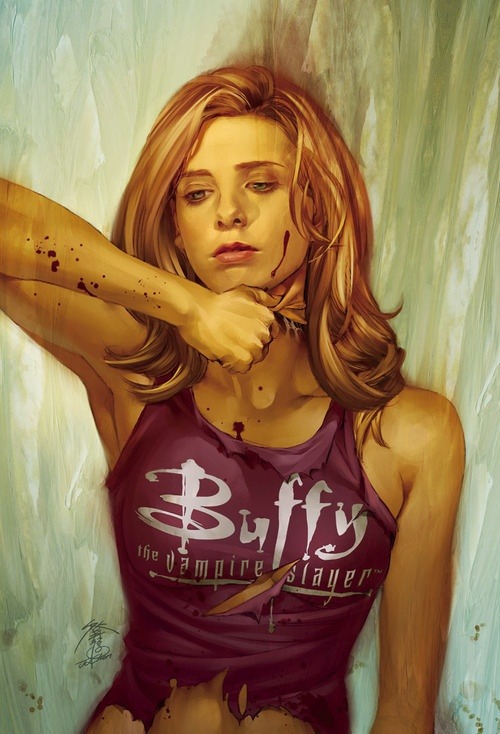
FXCF: What's next for you? Can we expect more feminist reimagining of tragic women from literature or are you exploring modern stories?
JACQUIE: Immediately, I’m working on a short film that centres around two mothers (certainly female heroes!) but I would love to do more feminist re-imaginings of tragic female literary figures... I’m comin' for you Desdemona! :)
FXCF: We can’t wait!
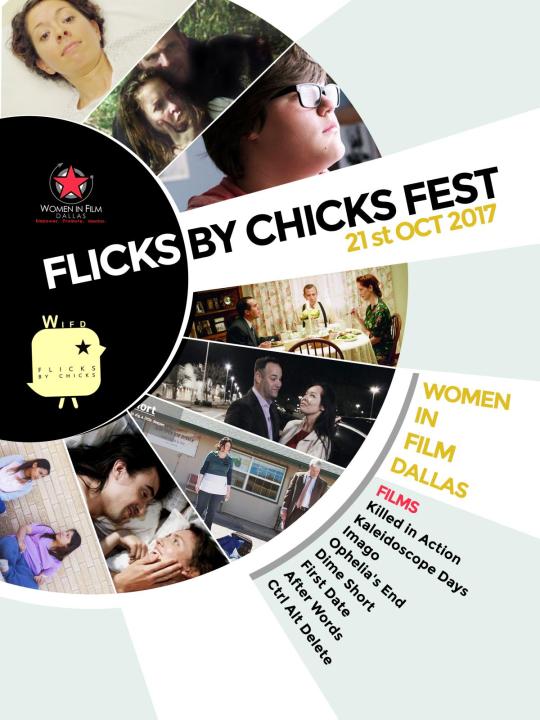
ABOUT THE FILMMAKER:
Jacqueline Pepall is an award-winning director for film and television. Her recent credits include the short film 'Visiting Mr Keats' (Best Comedy, Los Angeles Independent Film Festival Awards 2016; Best Short, NYC Indie Film Festival 2016; London Independent Film Festival 2016; Amsterdam Lift-Off Film Fest 2016), 'We'll Meet Again' (Grand Prize Nominee, IMW Film Festival 2016; Best Foreign Film Nominee, New Hope Film Festival 2016), and the television series, Then Dance (Sky Arts /Arts Council England 2014-2016, British National Lottery Award nominee, Best Use of Public Funds).
Jacqueline runs the independent production company Great Lake Films. She also works closely with the Royal Central School of Speech and Drama, directing films for the MA in Screen Acting programme.
The UK Trade and Investment Commission recently selected Jacqueline's adaptation of the novel These Dark Wings for support through their 'UK Talent Goes to Hollywood' Initiative.
Jacqueline is the 2016/2017 Hospital Club Foundation's Emerging Creative for Film and Television.
Great Lake Films has offices in London, UK and Toronto, Canada.
0 notes
Photo

La La Land’s love letter to romance and the city
Some screenplays don’t need to surprise you. Sometimes an experience works because what moves you is honesty, not originality. Sometimes an actor’s performance exposes something we know, not something we need to discover. And sometimes the craft can fall short and still work. All of this is true of La La Land, a place where dreamers and lovers need apply and cynics best… walk on by (cue Dionne Warwick).
Los Angeles is not only a backdrop to Sebastian and Mia’s romance, it’s a character, a setting that normalizes a soft shoe, a musical score, a story told in clef notes.
The plot is as clinky as it comes - small town girl comes to LA with dreams to be a movie star and falls for an uncompromising jazz musician. He challenges her to stop chasing bad work and find her own meaningful artistic voice, she pushes him to both follow his muse and take action on a long held dream.
The opening musical number in legendary Los Angeles traffic puts you in the drivers seat of expectations - this film wants to take you on a ride, make you feel and make you empathize.
The introductions to both characters show two people who are weaving through potential minefields and roadblocks, but mostly we know they share longing. Sebastian sits drinking coffee staring at the place he wants to start a jazz club with a storied history, Mia serves coffee on a studio lot to a lovely, gracious startlet reminiscent of Audrey Hepburn. They have an eye on the future while firmly planted in the past. In less capable hands, we’d expect urban outfitter hipsters, but Writer/Director Damien Chazelle, Ryan Gosling and most impressively Emma Stone never keep it simply on the surface. They wear the clothes, but also walk the walk. You could be bothered that they are simply serviceable singers and dancers, but their ability to sell a song and dance and move us emotionally is why we paid the price of admission.
I was disappointed in manufactured conflict in the second act. Mia’s disappointment in Sebastian taking a paying gig instead of starting his jazz club makes little sense. The fight they have ruining a romantic dinner wasn’t set up in any smart or real way. And her crisis/opportunity in executing her one woman show missed the mark in realism. Why would she only be able to muster 5 friends AND an important casting director to attend? We are supposed to believe she is a good actor, but riddled with self doubt - having few there and then overhearing friends discuss how bad it was doesn’t serve her narrative. She should have done the show, felt great about it and then had the double whammy of Sebastian not show up and over hear two jealous wannabes mean girling about her performance to whittle her self esteem.
But the film is so magical in its efforts that plotting missteps don’t really impact how you end up feeling when you walk out the door.
This is a film that celebrates love, dreams and paths not taken. Robert Frost would approve.
1 note
·
View note
Text
La La Land’s love letter to romance and the city
Some screenplays don’t need to surprise you. Sometimes an experience works because what moves you is honesty, not originality. Sometimes an actor’s performance exposes something we know, not something we need to discover. And sometimes the craft can fall short and still work. All of this is true of La La Land, a place where dreamers and lovers need apply and cynics best... walk on by (cue Dionne Warwick).
Los Angeles is not only a backdrop to Sebastian and Mia’s romance, it’s a character, a setting that normalizes a soft shoe, a musical score, a story told in clef notes.
The plot is as clinky as it comes - small town girl comes to LA with dreams to be a movie star and falls for an uncompromising jazz musician. He challenges her to stop chasing bad work and find her own meaningful artistic voice, she pushes him to both follow his muse and take action on a long held dream.
The opening musical number in legendary Los Angeles traffic puts you in the drivers seat of expectations - this film wants to take you on a ride, make you feel and make you empathize.
The introductions to both characters show two people who are weaving through potential minefields and roadblocks, but mostly we know they share longing. Sebastian sits drinking coffee staring at the place he wants to start a jazz club with a storied history, Mia serves coffee on a studio lot to a lovely, gracious startlet reminiscent of Audrey Hepburn. They have an eye on the future while firmly planted in the past. In less capable hands, we’d expect urban outfitter hipsters, but Writer/Director Damien Chazelle, Ryan Gosling and most impressively Emma Stone never keep it simply on the surface. They wear the clothes, but also walk the walk. You could be bothered that they are simply serviceable singers and dancers, but their ability to sell a song and dance and move us emotionally is why we paid the price of admission.
I was disappointed in manufactured conflict in the second act. Mia’s disappointment in Sebastian taking a paying gig instead of starting his jazz club makes little sense. The fight they have ruining a romantic dinner wasn’t set up in any smart or real way. And her crisis/opportunity in executing her one woman show missed the mark in realism. Why would she only be able to muster 5 friends AND an important casting director to attend? We are supposed to believe she is good with self doubt - having few there and then overhearing friends discuss how bad it was doesn’t serve her narrative. She should have done the show, felt great about it and then had the double whammy of Sebastian not show up and over hear two jealous wannabes mean girling about her performance to whittle her self esteem.
But the film is so magical in its efforts that plotting missteps don’t really impact how you end up feeling when you walk out the door.
This is a film that celebrates love, dreams and paths not taken. Robert Frost would approve.
0 notes
Text
Tess Rafferty writes what every adult at the halloween door is thinking!
As I spent this past weekend, dressed as Connor from Assassin’s Creed (if you are not a teenage boy and know who I am talking about - we should get a cocktail!) following my 9 year old son on a ‘F’ing golf cart to collect candy he doesn’t even care about...this brilliant post by the luminous Tess Rafferty struck my dem funny bone!
Read and relate!
************************************************************
What in the wide world of fuck has happened to Halloween?!
For starters kids don't actually say "Trick or Treat!" when you answer the door for them. No one has explained to them that out of all the social cues they will learn in life, this is perhaps the most important one. Without "Trick or Treat" I'm just left staring at them like some candy dispensing machine wondering what the play is here. It's like a bad meeting where I have to make small talk with an executive who is either unable to or uninterested in making small talk back. Perhaps it’s just genetics and they’re the progeny of all the executives who I had to "soft pitch" ideas to. My cats even know they have to Meow for a treat and they don't go to a 30k a year middle school.
And if they’re not bothering with Trick or Treat, it goes without saying that you’re getting nary a please or thank you. Were they raised by wolves or just narcissists? And this year a good many of them didn't even ring the bell. It was up to me to see that they were standing there and open it for them, I guess? Is this a side effect of helicopter parenting? Do their parents do so many things for them that they don't even understand that in order to get the candy the literal bare minimum they need to do is ring the goddamn bell!?
Another disturbing trend in recent years is that when I ask, “Who are you?” they either stare at me blankly (more of the blank stares, is it because I’m not a screen?) or tell me their actual name. And I’m not talking about just the wee little ones either. I can only imagine that this is a side effect from hearing their parents scream “Do you know who I am?!” at some unsuspecting pilates instructor or valet attendant. I found if I wanted any kind of a useful answer I had to rephrase the question like it’s fucking marriage counseling and say “And who are you dressed up as?” I was working really fucking hard for this and I wasn’t the one getting candy.
And speaking of the ones getting the candy, when did it become socially acceptable for adults to just reach their mitts into the bowl and take candy? Last night a woman, not even in costume, came up after her kids got candy, and not only took about 4 pieces, but then made some comment about what she liked or didn’t like in my bowl. I would have said something, but I was already exhausted from lecturing the kids on their bad manners. I sent one kid to the back of the line for complaining that it was taking too long and rushing my front door like it was a Who concert in Cincinatti or a football game in England. Yes, I'm that lady now.
As if it wasn’t bad enough that so many adults feel the need to dress up, like they just can’t bear the thought of their kids getting more attention than them for one night. Last year a very shy kid, let's call him 9-ish, showed up at my door wearing a tee shirt and shorts. I asked who he was and surprise! he started to give me his name. I then noticed his tee shirt said Camp Crystal Lake and I said, "Oh are you a camper from that Friday the 13th movie?" His father, also wearing the same tee, said, "Finally! Someone gets it!" I wanted to say, "Yes, dummy, because I'm you're age." He then motioned to his wife/assistant/healer and was like, "We're both counselors."
And again I wanted to say, "Good for you! But this isn't your night.Your kid looks like he wants to disappear and isn't he too young for such a scary movie?" But because I had not nearly enough to drink, I did not. It made me miss the days my dad angrily smoked on the sidewalk wanting to know if I was done yet.
But maybe I should be glad that at least someone wants to dress up, because the kids sure as shit don’t care to. One girl wore her school lacrosse shirt and said she was a lacrosse player. Sure, and I’m a Hillary supporter by your definition. While I know that’s spooky for some backwards parts of this country, it doesn’t really count as a “costume.” Jesus Christ, I don’t know that I’ve ever seen kids more bored with the idea of getting to wear a cool costume and getting FREE FUCKING CANDY for it! In an election year where everyone is bitching that people need to pull themselves up by their own bootstraps or strappy sandal laces or whatnot, we have a holiday where we spend $100 on Type 2 Diabetes pellets and then give it to sullen children who do nothing for it and seem rather indifferent about it.
At the risk of telling you about the time I walked to Halloween both ways in the snow, every year I went out for Halloween, which was well into my teens, I got super excited about planning my costume and getting to wear it and when I wasn’t excited any longer, I stopped going, because they sell candy in stores. So there’s no shame in being bored with Halloween, kids. But if you’re going to come to my door and demand to be fed, show a little effort. For fuck’s sake, hookers and johns have a less perfunctory exchange.
Every year there are kids who show some effort as well as some sort of brains. I’ve seen a Martha Washington. A Circe. I saw a kick ass unicorn last night as well as an awesome box of donuts trick or treating with a box of pasta. Costumes that took some thought and creativity and looked like more than just what the kid had on before they headed out the door. I saw a kid look exactly like someone from a panel in a Walking Dead comic, which I only know because he had to show me the pic on his phone, which I guess he resorted to carrying around with him otherwise no one would get it. But at least he had a vision and went for it, unlike the girl in the blue flowered sundress who pinned a sign to herself that said, “Alice in Wonderland” or the 3 or 4 kids I saw through the course of the night just wearing Minecraft hoodies.
Every year the rudeness and apathy seems new and then I am reminded about the night 3 years ago when I opened the door to 3 'tweens one of whom kept talking about hashtags while I stood there with candy. I said, That's not how it's done," and the same girl replied, "Whatever. Give us candy." I then ignored her to talk to her friends about their costumes and give them candy. When I asked the second girl what she was as she was just wearing her pajamas (honestly!) the girl once again snapped, "I told you. Just tell people you're Taylor Swift!" (The PJ Girl's answer was a much less creative, "A person in pajamas.") Finally I got back to Hashtag girl and she took a piece of candy. I said, "I was mouthy like you. It's not going to go easy on you. Take two." �I then realized I was the crazy lady drinking wine and wearing cat ears and trying to dispense advice. So I told her, "It gets better." Because I've worked very hard to be the crazy lady drinking wine and wearing cat ears and on Halloween I get to be her.
http://tessrafferty.com/
0 notes
Text

42 Seconds and more to a well crafted scene
One of the most exciting illustrations of everything I believe about a good screenplay can be found in the dinner scene in Christina Kallas’ improvisation on love, 42 Seconds of Happiness. It comes right at the tail end of the first act. Most of the main characters have been introduced or discussed by this time and their conflicts, relationships and goals are set up well, looming over the narrative like the plot’s impending Hurricane. The weather might be what they are bracing for as a possible spoiler for the weekend’s wedding, however they end up with a different kind of storm.
This dinner scene or more accurately scenes as there is time passage is a whopping 18 plus minutes. The sequence thrives because of the deft work of the set up. Kallas is able to establish prototypical characters with relatable wants, motivations and concerns. She is aided enormously by natural, gifted actors who give “other directed” performances that support the material. Every emotion during the dinner triggers an action and in turn, a reaction from another character. The emotional shifts are full of conflict and logic – the hallmarks of good writing. Surprise us with an unexpected, yet truthful outcome and the audience will buy the ticket to ride.
This dysfunctional group has gathered for the wedding of Cybil and Maria. The dinner sequence includes the brides to be, recent parents, Ike and Felice, Maria’s divorced brother Tomas, Cybil’s war vet student, Ben, the brides emotionally wounded friend, Vineke and eventually the arrival of Tomas’ ex wife, Alis with her new man, Marc.
With the wine flowing, immediately Tomas creates conflict by managing to insult, poke or pry into the vulnerabilities of every one at the dinner. One of the most successful elements is Kallas’ ability to craft complex characters and therefore complex relationships.
One terrific example is the small subplot dynamic between Tomas and Vineke. It appears that Vineke places some blame for her own divorce on Tomas either directly or indirectly. She is the most direct of the group in calling out his bad behavior and chastising him. Yet, when Tomas’ ex shows up with her new guy – she takes no pleasure in Tomas’ obvious distress and is the most vocal critic of Alis’ action. And like all good writers, Kallas doesn’t leave any subplot dangling. Near the end of the film, Tomas and Vineke have a short scene with a nice healing connection. It’s not cheapened by a hint of romance to produce a false happy ending, but truthful to their established relationship.
42 Seconds of Happiness is at times a master class in the satisfying moment, scene or scene sequence. Having won “Best Feature” at the Texas Women’s Film Festival where it debuted, it is currently on its festival journey. I encourage you to find it when it comes close to your home base.
3 notes
·
View notes
Text
42 Seconds and more to a well crafted scene
One of the most exciting illustrations of everything I believe about a good screenplay can be found in the dinner scene in Christina Kallas’ improvisation on love, 42 Seconds of Happiness. It comes right at the tail end of the first act. Most of the main characters have been introduced or discussed by this time and their conflicts, relationships and goals are set up well, looming over the narrative like the plot’s impending Hurricane. The weather might be what they are bracing for as a possible spoiler for the weekend’s wedding, however they end up with a different kind of storm.
This dinner scene or more accurately scenes as there is time passage is a whopping 18 plus minutes. The sequence thrives because of the deft work of the set up. Kallas is able to establish prototypical characters with relatable wants, motivations and concerns. She is aided enormously by natural, gifted actors who give “other directed” performances that support the material. Every emotion during the dinner triggers an action and in turn, a reaction from another character. The emotional shifts are full of conflict and logic – the hallmarks of good writing. Surprise us with an unexpected, yet truthful outcome and the audience will buy the ticket to ride.
This dysfunctional group has gathered for the wedding of Cybil and Maria. The dinner sequence includes the brides to be, recent parents, Ike and Felice, Maria’s divorced brother Tomas, Cybil’s war vet student, Ben, the brides emotionally wounded friend, Vineke and eventually the arrival of Tomas’ ex wife, Alis with her new man, Marc.
With the wine flowing, immediately Tomas creates conflict by managing to insult, poke or pry into the vulnerabilities of every one at the dinner. One of the most successful elements is Kallas’ ability to craft complex characters and therefore complex relationships.
One terrific example is the small subplot dynamic between Tomas and Vineke. It appears that Vineke places some blame for her own divorce on Tomas either directly or indirectly. She is the most direct of the group in calling out his bad behavior and chastising him. Yet, when Tomas’ ex shows up with her new guy – she takes no pleasure in Tomas’ obvious distress and is the most vocal critic of Alis’ action. And like all good writers, Kallas doesn’t leave any subplot dangling. Near the end of the film, Tomas and Vineke have a short scene with a nice healing connection. It’s not cheapened by a hint of romance to produce a false happy ending, but truthful to their established relationship.
42 Seconds of Happiness is at times a master class in the satisfying moment, scene or scene sequence. Having won “Best Feature” at the Texas Women’s Film Festival where it debuted, it is currently on its festival journey. I encourage you to find it when it comes close to your home base.
3 notes
·
View notes